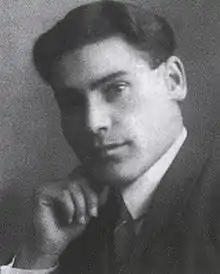Aram Yerganian
Aram Yerganian (Armenian: Արամ Երկանեան; May 20, 1900 — August 2, 1934) was an Armenian revolutionary who was noted for his assassination of Behaeddin Sakir and Fatali Khan Khoyski as an act of vengeance for their roles in the Armenian Genocide and the massacre of Armenians in Baku respectively.[1][2][3] He is considered an Armenian national hero.[4]
Aram Yerganian | |
|---|---|
 Aram Yerganian | |
| Born | May 20, 1900 |
| Died | August 2, 1934 (aged 34) |
| Resting place | Cordoba (Armenian Revolutionary Federation headquarters) |
| Known for | Assassinating Fatali Khan Khoyski, Cemal Azmi and Bahattin Sakir |
| Political party | Armenian Revolutionary Federation |
Early life
Aram Yerganian was born in Erzurum on May 20, 1900.[1] He was the third child of Sarkis Yerganian and Mariam Soghoyan-Yerganian. He attended a local school in Erzurum.[1]
Yerganian, who witnessed the Armenian Genocide, sought refuge in the Caucasus.[5] In 1917 he enlisted for the Armenian volunteer detachments and fought for General Dro in the Battle of Bash Abaran. With a victory over the Ottoman forces and the establishment of the Democratic Republic of Armenia in 1918, Yerganian enlisted in the executive body of the Armenian Revolutionary Federation that was instrumental in the establishment of Operation Nemesis, a covert operation aimed at assassinating all key organizers of massacres against Armenians both in Azerbaijan and in the Ottoman Empire.[1][5]
Operation Nemesis
After Armenia lost its independence to the Bolsheviks, Yerganian went to Tbilisi where he and Misak Grigorian were assigned to assassinate former Prime Minister of the Democratic Republic of Azerbaijan Fatali Khan Khoyski and leader of the Musavat party Khan Mahmadov.[2] On June 19, 1920, they met at Tbilisi's Yerevan Square as they awaited a signal from their accomplices. When Khoiski and Mahmadov were 100 to 150 meters away, they immediately opened fire on them. Khoiski was killed instantly, but Mahmadov, who was only wounded, escaped.[2]
After his task in Tbilisi was finished, Yerganian went to Constantinople where he attempted to recruit more avengers for the operation.[2]
Yerganian and Arshavir Shirakian were later given the task to assassinate both Cemal Azmi and Behaeddin Sakir who were in Berlin. On April 17, 1922, Shirakian and Yerganian encountered Azmi and Sakir who were walking with their families on Uhlandstrasse.[6] Shirakian managed to kill only Azmi and wound Sakir. Yerganian immediately ran after Sakir and killed him with a shot to his head.[2][7]
Later life
After his action in Germany, Yerganian went to Austria and then to Bucharest where he lived until he moved to Buenos Aires in 1927. In Buenos Aires Yerganian became an editor for the local "Armenia" newspaper.[1]
In 1931 he married Zabel Paragyan and had one daughter.[1]
After contracting tuberculosis, Yerganian moved to Cordoba where he died on August 2, 1934, at the age of 34.[8] He is buried at the local Armenian Revolutionary Federation headquarters.[1]
References
- "Aram Yerganian - Biography" (PDF) (in Armenian). Operation Nemesis. Retrieved 26 May 2013.
- Derogy, Jacques (1990). Resistance and revenge: the Armenian assassination of the Turkish leaders responsible for the 1915 massacres and deportations. Transaction Publishers. p. 61. ISBN 9781412833165.
- "The Avengers". Operation Nemesis. Retrieved 26 May 2013.
- Nazer, James (1968). The first genocide of the 20th century: the story of the Armenian massacres in text and pictures. T & T Publishing Inc. p. 158.
- "National Hero Aram Yerganyan Remembered". Asbarez. Retrieved 26 May 2013.
- "Two 'Young Turks' Murdered in Berlin" (PDF). New York Times. April 19, 1922. Retrieved 25 May 2013.
- Berberyan, Nazaret (April 13, 2010). "ՏԱՐԵԴԱՐՁՆԵՐ- Արշաւիր Շիրակեան Հայ ժողովուրդի Արդարահատոյց Բազուկը". Asbarez (in Armenian). Retrieved 25 May 2013.
- Houshamadian of Armenian Revolutionary Federation (ARF) Dashnaktsutiun Album - Atlas Volume 2, Jacob Manjikian Editor, Next Day Color Printing Inc. (2000), p. 215